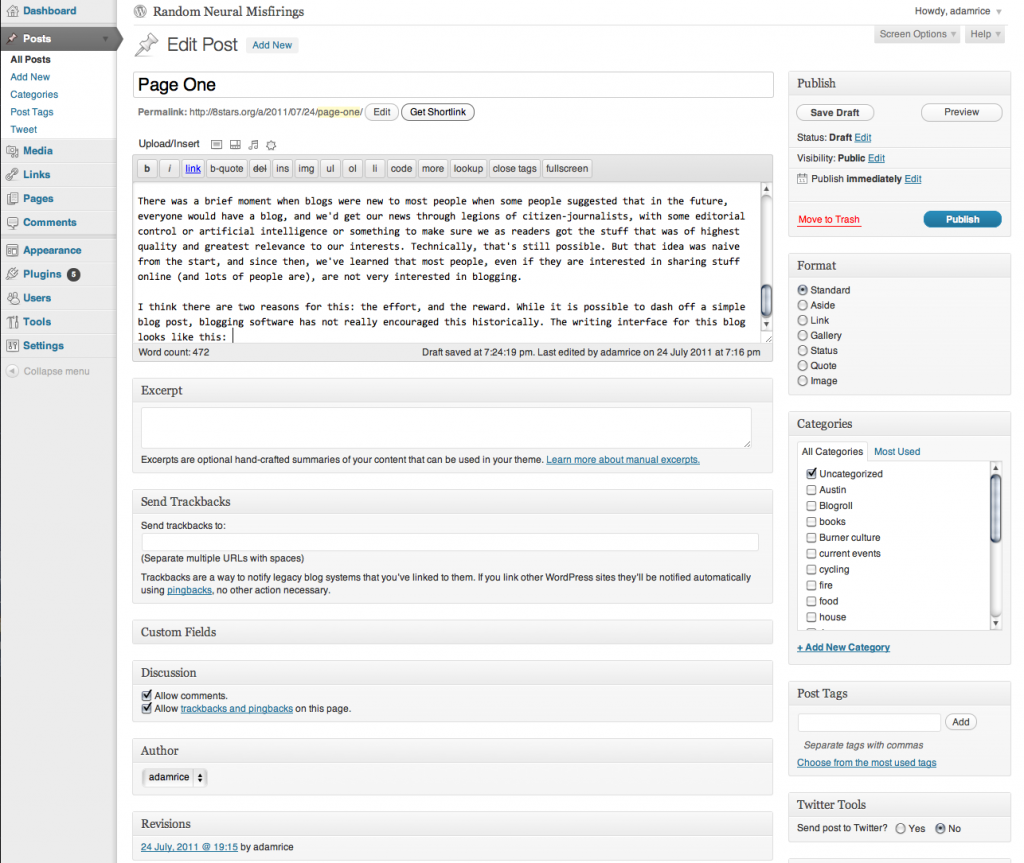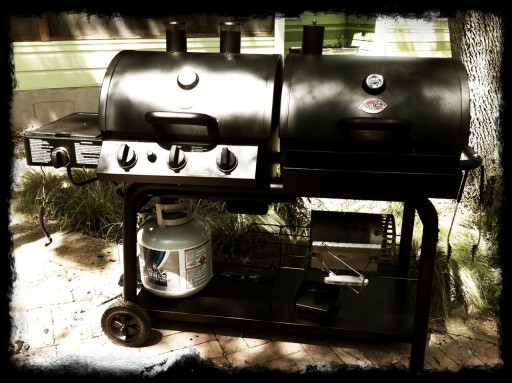Page One
Gwen and I recently saw Page One, the documentary about the New York Times.
It was a sort of mile-high survey of the problems that most American newspapers are facing today. It was interesting watching it while the scandal surrounding Rupert Murdoch’s British tabloids is at its peak—Murdoch had nothing to do with the movie except extolling the iPad as the potential savior of the newspaper industry. The issues that the movie touched on—and there were so many that it didn’t really have much time to do more than touch on them—are all familiar to anyone paying attention to the news about newspapers—declining ad revenue, competition from online sources, the chummy, codependent relationship with power that leads to horrors like Judy Miller—but it was still very interesting seeing these discussed by the people directly affected by them.
Just as the movie hopscotched from issue to issue, it never quite developed a central thesis. But if a documentary can have a hero, this one definitely did in the person of David Carr. And if it can have one defining moment, this one’s came when he was on a panel talking about the future of journalism or something like that, clearly representing the old guard. At one point, Michael Wolff stands up and talks about how the world would manage without the New York Times. Then Carr gets up, shows a printout of the Newser.com (Michael Wolff’s project) front page; then shows the printout with all the stories sourced from old media ripped out, leaving nothing but a rough paper sieve.
There was talk about the role of the professional journalist vs citizen-journalists, of whether the civic function of newspapers actually makes business sense. There was a lot of talk about Twitter. Interestingly, not a lot about Facebook. The talk about blogs was mostly in the context of tabloid-grade professional blogs like Nick Denton’s properties—at one point, Denton is interviewed, and we see his “leaderboard”—the most popular current stories—on a big TV. None of the stories are news. They’re gossip.
For a brief moment, when blogs were new to most people, some people suggested that in the future everyone would have a blog and we’d get our news through legions of citizen-journalists, with some editorial control or artificial intelligence or something to make sure we as readers got the stuff that was of highest quality and greatest relevance to our interests. Technically, that’s possible. My friend Chip long ago set up the website Austin Bloggers, where anyone with a blog can post a link to their Austin-related postings. There’s definitely some good stuff there that’s too finely focused for traditional media.
But the idea that citizen journalists could replace professional journalists entirely was naive from the start, and since then, we’ve learned that most people, even if they are interested in sharing stuff online (and lots of people are), are not very interested in blogging per se.
I think there are two reasons for this: the effort and the reward. While it is possible to dash off a simple blog post, blogging software has not really encouraged this. The writing interface for this blog looks like this:

Admittedly, there are blogging systems that are simpler than this, but this is the system I’m using, and it’s a mainstream one. Contrast that with the posting interface for Twitter:

Even once you’ve got a blog set up, there’s just a lot more cognitive load in getting a post up.
And then there’s the payoff. With Twitter or Facebook, your friends are probably going to see what you write and can easily comment on it; if you’re writing something personal, it’s relatively easy to make it so that only your friends see it. There’s more of a message-in-a-bottle quality to a blog post. Friends are less likely to comment (partly because even the commenting interface is more complicated, thanks in part to comment spam in blogs), and making a blog post visible only to friends involves considerably more administrative overhead for the writer and readers. Live Journal, as easy as it is to ridicule as the repository for bad poetry by teenagers, got this right by providing a blogging platform with social-networking features built in.
And unfortunately, while Facebook and Twitter have displaced what might have otherwise been a lot of blogging, they have not adequately replaced blogging. They’re fine for ephemeral, off-the-cuff communication—better than a blog, I’d say. A friend’s Twitter or Facebook postings are like a running stream that I can dip into when I feel like it, but they don’t work as a repository for sustained writing—one the writing side, because Twitter and Facebook are designed for off-the-cuff and short writing, and on the reading side, because it’s relatively difficult to backtrack and look at previous postings. As a medium for citizen journalism, this means that Twitter can be useful as a channel for minute-by-minute breaking news (Facebook less so, because posts are more often hidden from those you don’t know even if they are on Facebook, and Facebook in general is walled off from the rest of the Internet), but worthless for anything longer than that—especially with Facebook, where it seems almost impossible to dig up an old post. The same is true for discussions on posts, so while Facebook is great for getting people talking, it’s lousy for looking back at what people were talking about. For superficial gossip-grade conversations, this is fine. For more substantial discussions that one might want to look back on, it’s a problem.
Google Plus is too new to have been discussed in the movie. It allows for longer-form writing than Twitter or Facebook. The fact that Google is behind it suggests that maybe old posts would be searchable (though right now, they aren’t). And Google already owns a blogging platform, Blogger. I’ll be interested in seeing how they play out.
